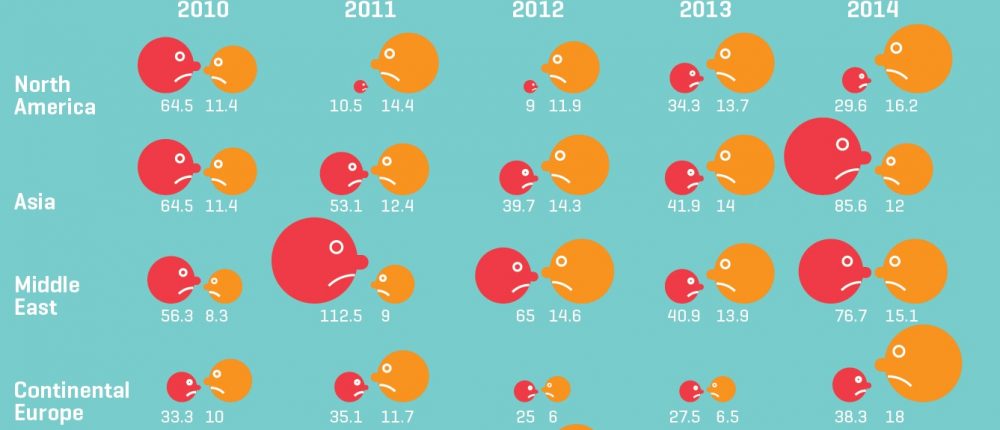Call for feedback about the draft International Construction Measurement Standards
Construction industry leaders from around the world are working together to set out a radical new approach to improve the quality of cost data and reporting in construction. Your feedback can influence their work.
Until the late 20th century, companies around the world applied country-specific standards when preparing their financial statements. The increased globalisation of business drove the need for common standards in the accounting arena and the International Financial Reporting Standards (IFRS) were born.
These provide a single set of globally applicable rules which enable comparison of financial performance on a like for like basis. Over the last decade, globalisation has also significantly impacted the land, real estate, construction and infrastructure sectors:
- Internationally, real estate assets reached a value of $217tn in 2015, three times the world’s annual income, 60% of the value of all global assets, including equities, bonds and gold, 36 times the total value of all the gold ever mined (Source: Savills World Research).
- Overall, close to $78 trillion is expected to be spent on infrastructure globally between 2014 and 2025 (Source: Oxford Economics/PwC).
While construction has rapidly moved from being a local to global industry, the way it measures and reports costs varies significantly from one market to the next. In some markets, there are no standards at all. This makes it difficult to compare project costs, hampering decision making and creating barriers to investment.
‘Mutual consent on standards across the industry’ is called for in the World Economic Forum’s report, Shaping the Future of Construction (May 2016), and creating a common language for the sector is the aim of one global initiative pioneered by the International Construction Measurement Standards (ICMS) Coalition.
The ICMS Coalition is a growing group of more than 40 not-for-profit organisations spanning architecture, construction, infrastructure and civil engineering. They first formed during a meeting held at the International Monetary Fund in in Washington D.C. in 2015.
To tackle the problem of cost reporting inconsistency, they are seeking to create a universal system for presenting the cost of construction projects which will allow comparisons to be made on a like-for-like basis between countries.
For more information, see International Construction Measurement Standards (ICMS).
The ICMS Coalition realise that collaboration presents an opportunity to bring monumental improvements to the sector by working together properly for the public interest. They are calling for professionals to support the collaboration and help embed common standards at the heart of construction investment.
The Coalition is consulting extensively with governments, NGO’s, clients, consultants and contractors in order to develop, refine and embed ICMS in working practices.
See Lian Ong (Malaysia), Chair of the ICMS Standards Setting Committee, Chairman of Commission for Construction Economics and Management (Commission 10) of International Federation of Surveyors (FIG):
“ICMS has been established following calls from investors, financiers and clients of the construction industry demanding global rules in reporting, thereby allowing international comparisons on project costs through the use of consistent information.
“Benefits include greater clarity in assessing the feasibility of projects at global, NGO and national level and a BIM-friendly classification to enable the global collection of key data and cost drivers. We thank the organisations and individuals from around the world who are working with us and would like to encourage others to get involved and feedback to the final consultation by answering questions in the survey.”
Michael Framptom from the African Association of QS:
“We have a lot of investors coming to Africa and they need to be confident with the costs they are being presented with for infrastructures and buildings. We need clarity. We need transparency. We need to benchmark. We also need to have value for money. All these things are in the standards that are being written by the ICMS Coalition.”
Varughese Mathew, Global President of the Indian Institute of Quantity Surveyors:
“The world has become a global village and professionals travel from one country to another. Companies also move from one country to another to take different jobs so it’s important for people involved in construction projects to have standards they are familiar with. In this respect, ICMS will be an excellent tool.”
TT Cheung, President of the International Cost Engineering Council:
“ICMS will give us a platform that provides clarity and does away with uncertainty. Whether you are a user or service provider, this project is important.”
Julie De La Cruz FRICS, Technical Director, Arcadis and founder of the Philippines Institute of Quantity Surveyors:
“Arcadis operates in over 40 countries and we have projects in over 70 countries. In the Middle East alone we operate in five countries so you can imagine that we convert costs between different standards. ICMS as a universal standard approach will solve problems of inconsistency. It will help us deliver better value for money, consistency of approach and providing meaningful benchmark information.”
Neal Argent, Director, EY UK:
“ICMS for us is about how you create confidence in the market. How do you get good comparability of costs so that you remove the degree of variability that mega projects suffer from in terms of cost estimation.”
Written by:
- Alan Muse Global Director of Built Environment Professional Groups.
- Kate Symons, Global Communications Manager RICS, UK.
Please find the original article here.
--Future of Construction 15:26, 20 Jun 2017 (BST)
Featured articles and news
Statement from the Interim Chief Construction Advisor
Thouria Istephan; Architect and inquiry panel member outlines ongoing work, priorities and next steps.
The 2025 draft NPPF in brief with indicative responses
Local verses National and suitable verses sustainable: Consultation open for just over one week.
Increased vigilance on VAT Domestic Reverse Charge
HMRC bearing down with increasing force on construction consultant says.
Call for greater recognition of professional standards
Chartered bodies representing more than 1.5 million individuals have written to the UK Government.
Cutting carbon, cost and risk in estate management
Lessons from Cardiff Met’s “Halve the Half” initiative.
Inspiring the next generation to fulfil an electrified future
Technical Manager at ECA on the importance of engagement between industry and education.
Repairing historic stone and slate roofs
The need for a code of practice and technical advice note.
Environmental compliance; a checklist for 2026
Legislative changes, policy shifts, phased rollouts, and compliance updates to be aware of.
UKCW London to tackle sector’s most pressing issues
AI and skills development, ecology and the environment, policy and planning and more.
Managing building safety risks
Across an existing residential portfolio; a client's perspective.
ECA support for Gate Safe’s Safe School Gates Campaign.
Core construction skills explained
Preparing for a career in construction.
Retrofitting for resilience with the Leicester Resilience Hub
Community-serving facilities, enhanced as support and essential services for climate-related disruptions.
Some of the articles relating to water, here to browse. Any missing?
Recognisable Gothic characters, designed to dramatically spout water away from buildings.
A case study and a warning to would-be developers
Creating four dwellings... after half a century of doing this job, why, oh why, is it so difficult?
Reform of the fire engineering profession
Fire Engineers Advisory Panel: Authoritative Statement, reactions and next steps.
Restoration and renewal of the Palace of Westminster
A complex project of cultural significance from full decant to EMI, opportunities and a potential a way forward.
Apprenticeships and the responsibility we share
Perspectives from the CIOB President as National Apprentice Week comes to a close.




























Comments